Entertainment
/ArcaMax

The best films to get you in the New Year’s mood
The time for “Home Alone” and “It’s a Wonderful Life” might have passed, but you can continue the holiday spirit with these classic New Year’s flicks.
When Harry Met Sally … (1989)
This iconic romantic comedy crescendos when Harry and Sally, played by Billy Crystal and Meg Ryan, confess their love for each other on New Year’s ...Read more
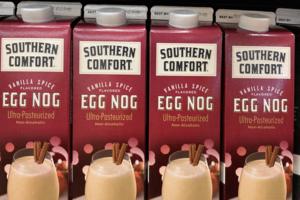
Buying eggnog? It can be a holiday kitchen helper, too
Call it the pumpkin spice of the winter holidays: Eggnog seems to be everywhere.
There are organic, dairy-free, lactose-free, extra-creamy and reduced-fat versions; it’s also the essence of flavored extracts, cookies and coffee creamers. There are eggnog flavors, too, including gingerbread and, yes, pumpkin spice.
But what is it and why is ...Read more
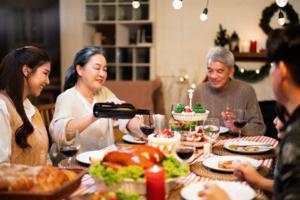
5 rules for hosting your first holiday dinner
You likely have been to countless holiday dinners, starting before you could even remember. As you grow older, relatives, close friends and coworkers have hosted dinners of their own, impressing you with new recipes and a great atmosphere.
However, the reality of hosting your own dinner party is different from attending. Seating, feeding and ...Read more

Feeling all the feels? Here’s why holidays can hit your emotions harder
One minute you’re crushing your holiday shopping list and the next you’re ugly crying in the car because your ex’s favorite song came on the radio. Or perhaps you find yourself alone baking Christmas cookies — the ones your mom used to make when you were little. If the holidays have a way of turning you into an emotional wreck, know ...Read more

Classic NA drinks you can make at home
I love a good cocktail, nice wine and the occasional beer, yet not everyone does. Many of our friends and most of my family won’t touch the stuff. As a friend and host, it doesn’t seem fair to offer mere soda while others are popping champagne. Happily, there are delicious alternatives for that festive toast.
I’m not talking about overly ...Read more
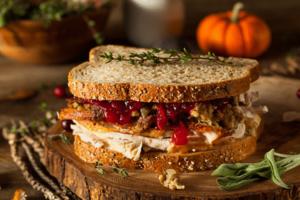
Reimagine your Thanksgiving meal with leftovers in mind
When it comes to Thanksgiving leftovers, there are two types of people — those who love leftovers (sometimes more than the feast itself), and those who are completely over them by Friday night.
OK, maybe it’s not that cut and dried. I admit to being in the latter camp more than the former, mostly because I haven’t done much to transform ...Read more

Holiday snack-tackular: 5 sweet and savory snacks to make for and share at a holiday party
Many of us, if we're lucky, will get together with the people we enjoy spending time with over the December holidays. Large and fancy, or small and unabashedly cozy in a relative's or BFF's living room, the gatherings offer a chance to connect with family and friends — some we may not have seen for a while — and celebrate the ties that bind....Read more

Gretchen's table: Scampi alla Buonavia will fit right in with Feast of the Seven Fishes dishes
I'm not Italian — my parents are German and I married into an Irish clan — but I often wish I were because I think they have the best cuisine and most romantic language.
This is particularly true around Christmas, when you find sweet Italian treats such as raisin-studded panettone and torrone on store shelves and restaurants that cater to ...Read more
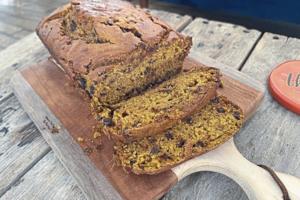
Gretchen's table: Chocolate chip pumpkin bread
If there's any one seasonal flavor people love to hate, it's gotta be pumpkin spice.
Come fall, the dynamic duo you once tasted only in pumpkin pie — and probably only at Thanksgiving — suddenly seems to dominate everything (and anything) from your morning latte to everyday products such as yogurt, hummus, pancake mix, hot sauce, Oreos and ...Read more

Being thankful doesn’t come naturally, but you can teach your kids how
As Thanksgiving edges closer, many people — even children — are thinking about what they’re thankful for this year.
Gratitude, however, does not come easy for everyone. This can be especially true for children.
Jody Baumstein, LCSW, a Strong4Life licensed children’s therapist at Children’s Healthcare of Atlanta, said there is no ...Read more
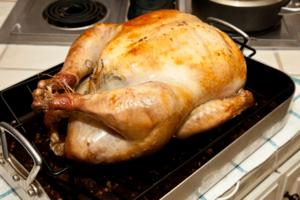
Turkey showdown: Is white or dark meat the healthier option?
As families gather around their Thanksgiving tables, the great turkey choice will inevitably have to be made: “White or dark meat?” Although many opt for white meat, believing it’s the healthier option, nutrition expert Dr. Lauri Wright said both have their positives.
“From a nutritional standpoint, the differences between white and ...Read more
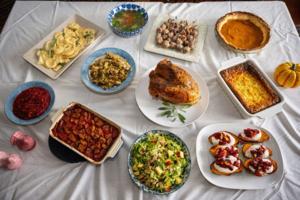
From our table to yours: Side dish recipes to borrow on Thanksgiving
Thanksgiving is often one of the year's most celebrated meals for many families because it brings people together before a bounty of absolute deliciousness.
The kids are off school and/or home from college, in-laws and other relatives have made it to town for a visit and there might even be a stray friend or two on the invite list. With so many...Read more










